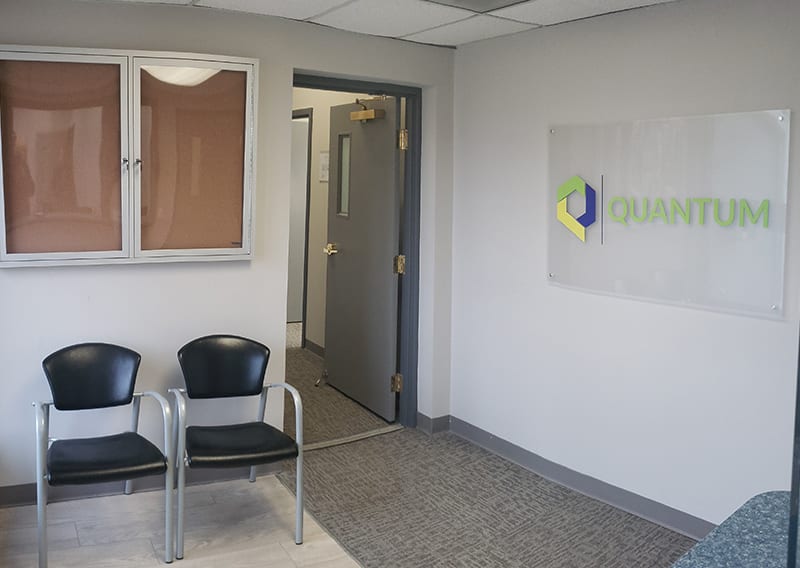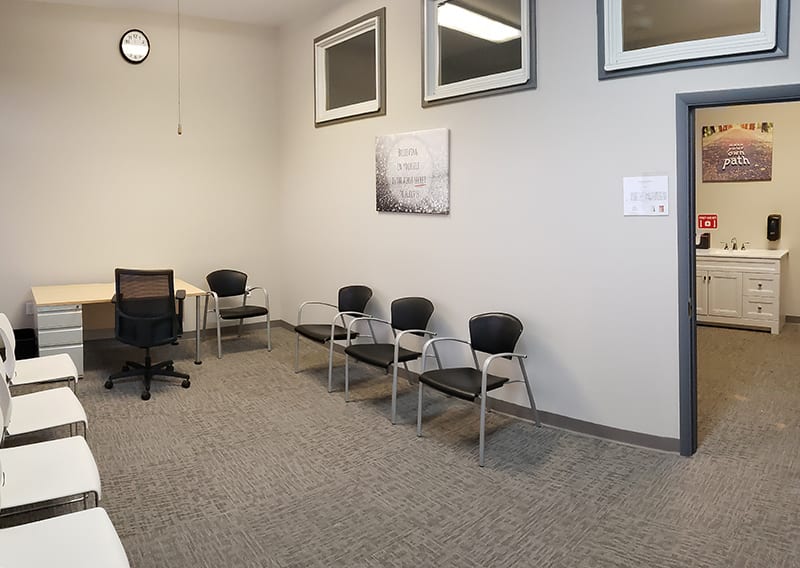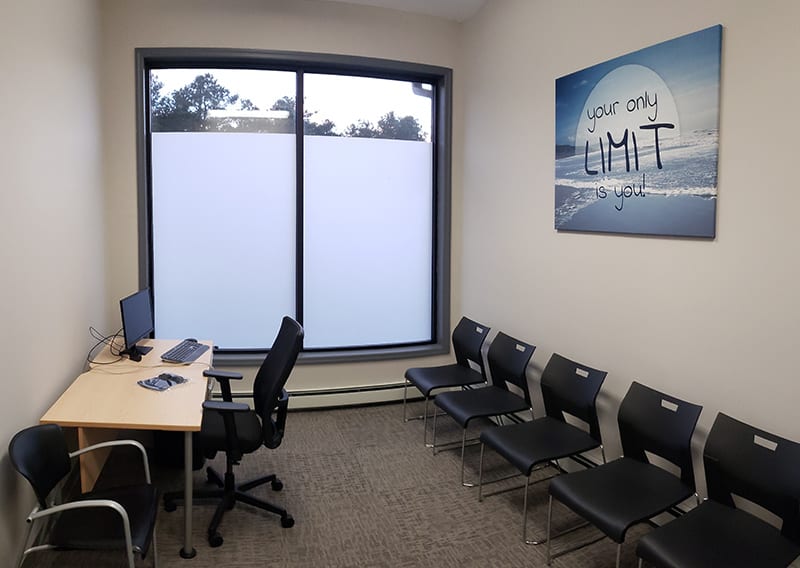Our facility is a warm, inviting, cozy, and secure environment that provides the perfect level of safety, comfort, and privacy as you receive treatment and get on your path to wellness. We’ve designed our space to allow for a low-stress environment where you can focus on your well-being.
Given the concerns of the COVID pandemic, we’re ensuring procedures are followed to create a clean environment for our patients, staff, and visitors. We’ve gone above and beyond CDC and New Jersey State guidance to design our cleaning and disinfecting protocol so that there is no question of the cleanliness and safety of our facility.
You’re here to get well and our priority is maintaining a safe, clean, peaceful, and welcoming environment for you to do just that.
To see our response to Covid-19, click here.
Photo Gallery
Click photos to enlarge
Are You Ready to Begin Your Journey to Recovery?
You could be completely covered. Verify Your Insurance Today.
The Quantum
Process Outpatient Rehab NJ
1. Make the Call
Contact our Quantum Team at
(609) 993 – 0733 to get started.
2. Complete
Your Intake
This streamlined process includes a series of questions and discussion of your unique needs and goals.
3. Get the Best Care Team Possible
After your intake, you’ll meet your Care Team, a group of amazing professionals dedicated to helping you make recovery reality.
4. On-Going Support
After you meet your Care Team, you’ll start to receive treatment based on a Care Plan that’s designed to help you achieve and sustain your recovery.
What is Buprenorphine?
Buprenorphine is a prescription medication used for the management of opioid addiction. Buprenorphine is an opioid agonist-antagonist that helps with opioid withdrawals from illicit opioids and prescription opioids. It is part of treatment for opioid addiction programs along with behavioral therapy, counseling, and lifestyle changes. Also, buprenorphine is an opioid that is used for pain management. As a treatment for opiate addiction and pain management, it can be used as a skin patch, by injection, or buccal and sublingual tablets. As a partial opioid agonist, it binds to opioid receptors to produce euphoria and respiratory depression, but the effects are weaker than full opioid agonists such as methadone or other opioid medications.
Buprenorphine Drug List Includes:
- Suboxone
- Subutex
- Bunavail
- Probuphine
- Sublocade
- Zubsolv
Buprenorphine Effects
Buprenorphine and methadone are highly effective for the management of opioid use disorder. Advantages of buprenorphine are that it greatly decreases cravings and opioid withdrawals, but without the full effects of short-acting opioids. As a long-term opioid, it binds to opioid receptors for its effects to last up to 3 days which can reduce negative effects. Some effects of buprenorphine include:
- Sense of well-being
- Relaxation
- Pain relief
- Euphoria or calmness
- Blurry vision
- Insomnia
- Nausea
- Low blood pressure
- Constipation
- Irritability
- Fever
- Muscle aches
- Slowed breathing or respiratory arrest
Signs of Buprenorphine Abuse and Addiction
Buprenorphine treatment was developed for the treatment of addicted individuals to overcome addiction to opioids, however, it can also have abuse potential. Even when taken as directed there is a chance for the person to develop a physical dependence, which can lead to withdrawals when they attempt to stop using. When someone has substance abuse issues with buprenorphine, some signs and symptoms include:
- Apathetic mood
- Erratic behavior
- Depression
- Poor memory and coordination
- Appetite loss
- Dilated pupils tearing
- Impaired or slurred speech
- Trouble sleeping
- Taking more than prescribed
- Itching
- Finding paraphernalia, such as syringes
- Unexplained weight loss
- Financial troubles
- Multiple prescriptions from different doctors and pharmacies
- Withdrawals when not using
Buprenorphine Withdrawal Symptoms
Taking buprenorphine over a long period of time can develop into buprenorphine addiction and dependence. The body no longer knows how to function without the drug and goes into opioid withdrawals when it is taken away. Stopping buprenorphine use can be challenging on your own because it is easy to relapse quickly to stop the withdrawals. Getting treatment for opioid abuse from a drug detox treatment center can greatly improve your chance of successfully detoxing. Opioid withdrawals last about a week or two, however, some more mild withdrawal symptoms can linger for months. Withdrawal symptoms include:
- Headaches
- Nausea and vomiting
- Muscle and body aches
- Lethargy
- Anxiety and depression
- Irritability
- Fever and chills
- Opioid cravings
- Sweating
- Insomnia
- Trouble concentrating
- Stomach issues
Long-Term Side Effects of Buprenorphine Abuse
Buprenorphine substance abuse can lead to several health issues. When attempting to stop using, the person can develop withdrawal symptoms which can be painful. If you find someone has substance abuse issues, it is important to get help from opioid treatment programs before the long-term effects take hold. Some of the long-term effects of buprenorphine addiction include:
Risk of overdose due to tolerance
- Hair loss
- Loss of libido
- Loss of control over emotions
- Hallucinations
- Respiratory depression
- Low blood pressure
- Pupil constriction
- Abdominal pain
- Confusion
- Dizziness
- Seizure
- Coma
- Anxiety
- Insomnia
- Depression
Buprenorphine Addiction Treatment
Buprenorphine addiction treatment consists of several levels of care for opioid addiction including drug detox, inpatient treatment, outpatient treatment, and aftercare programs. Drug detox can help those dependent on opioids withdraw safely and comfortably, however, this is just the first step in opioid addiction treatment which only takes care of physical dependence on opioid medications and illicit opioids. You are encouraged to participate in drug rehab as well to address the psychological and behavioral aspects of addiction. Treating opioid substance abuse includes behavioral therapy, group therapy, teaching new coping skills, and other opioid addiction treatments. After you have completed inpatient treatment, you can taper down levels of care into intensive outpatient treatment or outpatient programs. Opiate addiction is a lifelong disorder that requires the management of opioid use disorder through behavioral therapy and support groups like 12-step programming.
If you or someone you love is struggling with opiate addiction, Quantum Behavioral Health Services is available to answer your questions about addiction to opioids and addiction treatment available.








